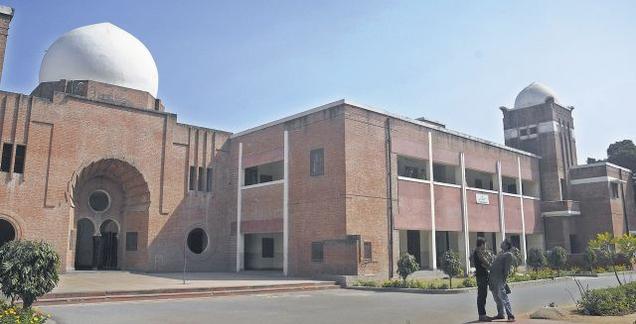
From building a medical college to masters’ course on disaster management, the V-C has big plans
From building a medical college, a new masters’ course on disaster management, to choice-based credit systems and even renewing the students’ union, Jamia Millia Islamia’s new Vice-Chancellor Talat Ahmad has big plans for the University.
“We have announced the building of a medical college on the 22-acre property, given to us recently by the Delhi Government. A medical college must have a 300-bed hospital, so we are in talks with a nearby hospital to link it to our proposed college, since starting the hospital first could take awhile. We already have a physiotherapy building, which has 100 beds, and we also have a dentistry department,” said Prof. Ahmad, while explaining that his background in geology and his association with several bodies doing research in the area of disaster management had made him think of Jamia’s need for a masters’ degree in disaster management.
“There will also be small courses, available to all students, basic knowledge that everyone should have about what to do during a disaster.”
Soon, it will be possible for an enrolled post-graduate student to actually take another course, which is far removed from his/her stream and even get credit for it.
“Suppose you are doing an MA in Economics and also want to study music, it will be possible to do so soon, and get credit for it towards your degree. Each department is currently working on the modalities of working out separate courses for students from other streams. It will be slightly easier and more general than something you will learn if you were taking that course full-time.”
Another ambitious plan is to put Jamia on the world rankings.
“We are on our way to getting NAAC accreditation. We are also consciously working to meet the parameters required for a good international ranking. Faculty publications, foreign exchange programmes between students and teachers, we are doing it all.”
Jamia is also known for several small centres of study.
“We intend to merge all these centres into a school or faculty for smoother operations.”
It is also known for its seminars on various subjects under its outreach programmes. “We intend to strengthen this to provide short-term courses to people in the neighbourhood, skill-based learning that can be useful.”
Placements are another area that the V-C wants to focus on.
“We will be strengthening the links between the placement cell and the industry, and we are trying hard to forge better ties with national and international corporate houses.”
The varsity is also known for the number of language courses it offers. “Turkish seems to be the most popular language course here and almost all our students get placed. There is also French and German. We have national as well as international placements.”
Expanding the distance programme to other parts of the country, digitalising all their library resources and increasing their tie-ups with foreign universities are other projects on which the university is working feverishly.
Before concluding, Prof. Ahmad had a special message for students who had missed out on various entrance exams because of the Jammu and Kashmir disaster.
“Our professors will be travelling to Srinagar and conducting exams there. The results will be declared together.”
Special focus on research
Come January and the thick fog will bring Delhi to its knees with cancelled or late flights and trains, and traffic snarls.
Much before that, a few scholars at Jamia Millia Islamia will be working to somehow reduce the fog by “precipitating” it or turning it into rain.
This is one of the 93 ongoing research projects at the varsity, which Vice-Chancellor Talat Ahmad is seeking to develop further in his bid to up Jamia’s ante as a research-oriented university.
“The Chemistry Department is in-charge of the project. Another consortium will be using the Geographical Information System to connect crime, and there is a lot of work going on in the field of nanotechnology. We also plan to bring all the projects under one roof, so they can work together using the same technology,” Prof. Ahmad said. And this means the faculty will have to increase their citations.
“They will have to publish more internationally. In fact, this is also the benchmark for career progression as mandated by the UGC, so it serves both purposes. We have also set up a digital resource library that allows us to track every publication or citation that has been made by a faculty member. This is so we always know who has what publication and how much weight their publications carry,” the V-C added.
source: http://www.thehindu.com / The Hindu / Home> News> Cities> Delhi / by Vijetha S.N. / New Delhi – October 05th, 2014








